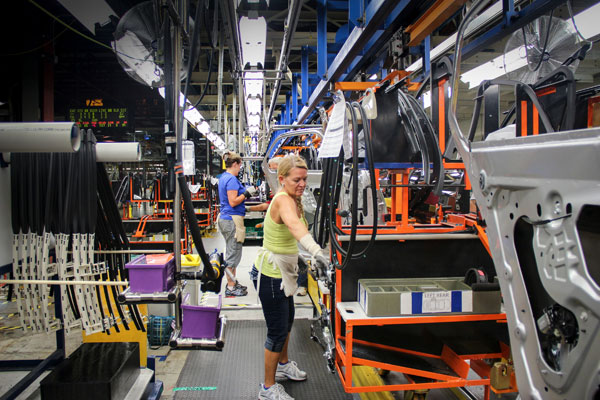
Canada not getting ‘fair share’ of auto investment
by Canadian Manufacturing.com Staff

New study contends the recent reshoring phenomenon has bypassed Canada and new investment has favoured the U.S. and Mexico
The report, released at the end of November, says that even though automotive manufacturing in Canada has rebounded to near pre-recession levels, capital spending has dropped to levels not experienced since the 1980s.
The study cites Statistics Canada data showing an average of $1.5 billion was directed to capital spending from 2009 through 2011, dropping by almost half of the approximately $3 billion the industry invested annually in Canada between 2000 and 2008.
While there are certainly many reasons leading to the reduced investment, this lack of productivity-enhancing capacity upgrades will eventually come home to roost.
Indeed, the report factors in a Morgan Stanley forecast that estimates 3.5 million units of capacity will be added by automotive manufacturers in North America from 2011 to 2015. Of that, the U.S. is poised to receive 63 per cent and Mexico will gain 34 per cent.
Canada’s projected share? 110,000 units of capacity, just three per cent of the total.
The CBC is reporting that by 2019 General Motors Corp. could pull out of Oshawa, Ont. and significantly reduce its Cami Automotive operation in Ingersoll, Ont., which makes Chevrolet Equinox and GMC Terrain SUVs.
The report outlines several cost disadvantages felt in Canada, including:
- Manufacturing is being directed to the Southern U.S. and Mexico because of the relative cost advantage. The cost differential between Canada and the U.S. South and Mexico results from higher costs in Canada related to labour, logistics and outsourced parts.
- All automakers employ some form of lean manufacturing and sharing of best practices, a condition which limits productivity divergences between assemblers’ facilities on one side of the border versus another, so a single automaker’s plant in Canada is not meaningfully different, in terms of productivity, than another plant owned by that automaker in the U.S.
- Negotiated contract provisions in Canada have responded to the impact of the rising dollar and new U.S. labour provisions on the competitiveness of Canadian operations. The resulting decline in labour costs in Canada, however, has not fully offset the appreciation of the Canadian currency, so relative costs (in U.S. dollar terms) have increased, and labour costs at current exchange rates are somewhat higher than in the U.S. (and much higher than in Mexico).
- Differences between Canadian and U.S. pension costs and other benefits provided to employees may also lead to labour cost differences between Canada, Northern U.S. states, and Southern U.S. states. Canadian plants have typically migrated to various forms of hybrid defined benefit-defined contribution pension plans. U.S. plants are almost exclusively defined contribution for new hires; a situation which does not always equate with lower cost, but most certainly shifts future risk.
- Canada’s traditional advantage of public health care is being eroded because assemblers in the U.S. have been able to shift retiree healthcare costs to Voluntary Employee Beneficiary Associations (VEBAs). That means risk has been reduced in the U.S. as it has shifted from the company to the employee. It must be acknowledged, however, that Canada still retains an advantage in active health care costs.
- Mexico’s significant labour cost advantage is only marginally reduced by higher taxes and transportation costs.
The study was prepared by CAPC’s Competitiveness Committee, which is co-chaired by Ray Tanguay of Toyota Motor Manufacturing Canada and Toyota Canada Chair, and Rob Wildeboer, Executive Chairman of Martinrea International.
Read the full report, A Call for Action: II, on the CAPC website
CAPC is an industry-led organization that examines the key competitive issues facing the Canadian automotive industry. Membership comprises the CEOs of Canada’s five automotive assemblers, CEOs of Canada’s leading parts suppliers, representatives of industry associations, the President of the Unifor trade union, the President of the University of Windsor, and provincial and federal ministers responsible for industry.
